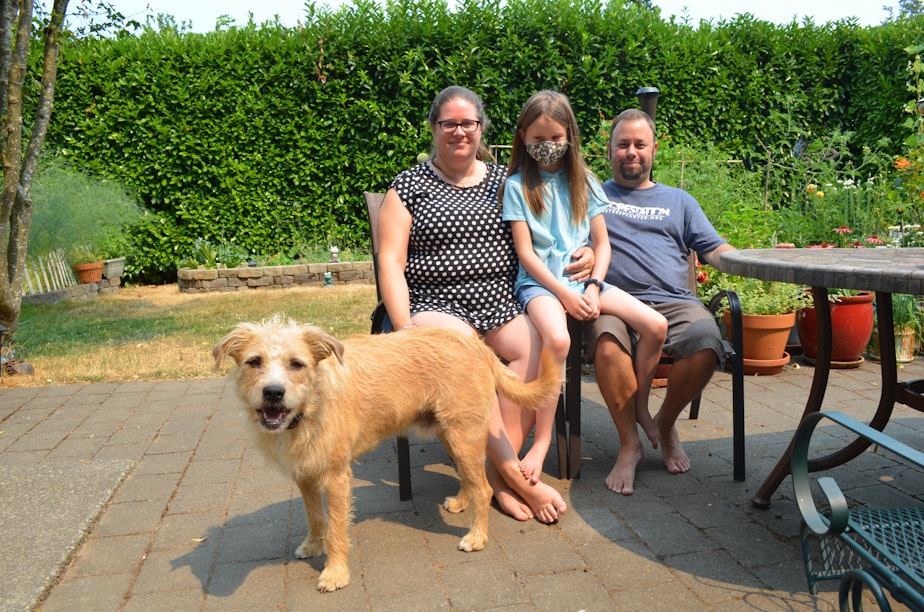Breakthrough cases have you headed for the bunker? Experts say vaccines are working

Breakthrough cases — vaccinated people testing positive for the coronavirus — have people wondering if the vaccines work as well as they were supposed to, or if their immunity is waning.
The short answer is, yes, vaccines are doing their job. Just 0.5% percent (that’s one out of every 200) of Washington state’s fully vaccinated residents have tested positive for the coronavirus. And the rates of hospitalization and death are much, much lower than that.
C
hris Robinson-Jahns lives with his wife and daughter in south Seattle. After he and his wife got vaccinated, the family started hanging out with friends, strictly outdoors.
The weekend after the Fourth of July, Robinson-Jahns and a vaccinated friend went inner-tubing near North Bend.
They drove together with the windows up — about a 30-minute drive — and spent the rest of their time outdoors, floating down the river. A few days later, Robinson-Jahns got a sore throat.
"I have pretty good seasonal allergies, so I didn't think anything of it," he said. "Then on Friday, I definitely had a sore throat, definitely was coughing a bit, definitely wasn't feeling good."
Sponsored
It didn’t occur to him that he might have Covid, because breakthrough cases weren't being discussed much at the time. But, later that day, Robinson-Jahns' friend — the one he’d gone inner-tubing with — emailed him to say that he had Covid.
Robinson-Jahns' first thought was his daughter.
"Thursday night, she had crawled into my wife and my’s bed — like between the two of us," he said. "I couldn't have been more than a foot from her, breathing on her all night. I'm like, 'Oh my God, my family.'"
Robinson-Jahns got tested, and it came back positive.
Health professionals knew breakthrough cases would happen. The vaccines are 92 percent effective, after all, not 100 percent. But breakthrough cases are rare, and not usually severe.
Sponsored
Unvaccinated people are six times more likely to test positive for Covid, said Dr. Jeff Duchin, the King County public health officer. And they're 67 times more likely to die of the disease.
Washington has tracked breakthrough cases by checking positive cases against its database of vaccinated people and by interviewing people who test positive about their vaccination status. At last count, half of a percent (0.5%) of fully vaccinated residents had tested positive. (Missing from this count are people who don't have symptoms or any other reason to get tested.)
Robinson-Jahns tried to trace the path of his infection. His theory is that he got Covid from his friend. Who got it from his dad. Who got it from a cousin. All of whom say they were vaccinated.
"Reading news, you’re told that it’s extremely rare," Robinson-Jahns said. "It didn’t feel extremely rare."
To prove or disprove Robinson-Jahns’ theory, you’d have to do DNA sequencing of virus samples from everyone involved. But it is statistically unlikely for the virus to pass through a long chain of vaccinated people.
Sponsored
But, when you become a statistic yourself, everything seems a lot more likely, said Jane Simoni, a psychology professor at the University of Washington.
"When it happens to you — when you're the one that it happens to — suddenly it's much more salient," Simoni said.
She said people tend to construct a story about how they got Covid. "That’s less scary than saying, 'I have absolutely no idea how this happened. It’s totally beyond my control,'" she said.
During his two-week quarantine, Robinson-Jahns started to worry about other unlikely scenarios. Did he give Covid to his daughter’s friend when he took them to the park? Would losing his sense of smell mean he’d end up with lifelong brain fog?
"I got sick, when I didn’t even do anything I thought was risky," he said. It was destabilizing to feel he didn’t have control, he said, and that he couldn't protect his family.
Sponsored
"There was definitely anxiety and a little bit of depression, just being alone and sick and not seeing my family and then reading about all these potential long-term effects," he said.
Stories like Robinson-Jahns' worry people with unvaccinated kids or vulnerable elderly at home. They wonder if they, too, could unwittingly bring home the virus.
But experts say his story shows that the vaccine works: He was never hospitalized and only got what he describes as a very bad, very long cold.
"I had a foggy brain," he said. "My throat definitely got more sore over the next couple of days. Then it moved up into my sinuses ... definitely lost taste for a number of days and couldn't smell very much either."
Also, as far as Robinson-Jahns knows, he didn’t pass the virus on to anyone else: neither his wife, nor his daughter, nor any other contacts.
Sponsored
That’s a success story, in a world where Covid is now a fact of life.
"As more people are vaccinated, we hear more about Covid infections among vaccinated people," Dr. Jeff Duchin, King County’s public health officer, said.
That’s math.
But, Duchin added, "breakthrough cases do not mean vaccine failure."
As long as they keep you out of the hospital and reduce your chance of passing the virus on to others, the vaccines are working.




